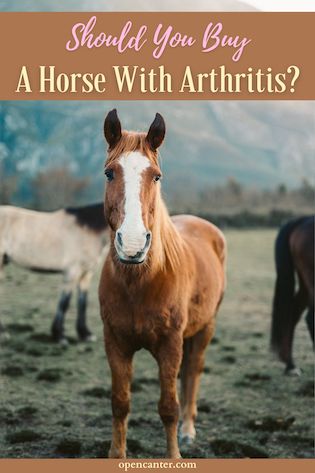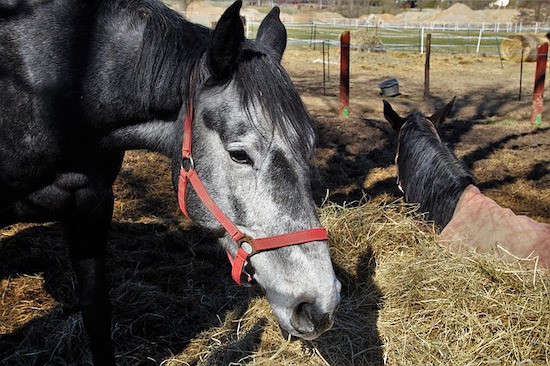Affiliate Disclaimer
As an Amazon Associate I earn from qualifying purchases. It helps me keep the website going. Thank you for your support.
Arthritis is a common yet complex disease, that can be managed with the right medication and exercise program. But the decision to buy a horse with arthritis is not so straightforward and depends on your and the horse’s circumstances.
The decision to buy a horse with arthritis depends on what activities you want to do with your horse. If you are looking for a light riding companion, then arthritis may not affect the horse’s suitability. However, if your plans include high-intensity activities like jumping or dressage, then a horse with arthritis is unlikely to be suited.
There are many factors that need to be considered if you are looking to buy a horse with arthritis. Read on to learn more about arthritis and how it affects horses.

What is Arthritis in Horses?
Arthritis is a term used to refer to several different diseases, which all affect a horse’s joints. For the purposes of this article, the term arthritis refers to osteoarthritis – the most common type of arthritis found in horses.
Osteoarthritis is an incurable disease of the joint where the bones, cartilage, and connective tissue become weak. The cartilage wears away, causing pain and a reduced range of movement. In some cases the cartilage wears away completely, leaving the bones rubbing directly on each other. The condition worsens over time, caused by ongoing wear and tear.
Arthritis may also be caused by malformed joints. The joints are not the correct shape, meaning they wear out faster or are subject to extra forces. Joints can form incorrectly prior to birth, or be damaged early in life, causing them to develop incorrectly. Mineral imbalances and poor nutrition in young growing horses can also cause this issue.
The other type of arthritis that can affect horses is immune-mediated arthritis. This occurs when the immune system abnormally attacks certain areas of the body. In the case of arthritis, the immune system attacks the joints, causing inflammation and damage.
Immune-mediated arthritis is not common in horses and is still under research.
What Causes Arthritis in Horses?
There are several things that lead to the breakdown of cartilage. In horses, the most common causes include repeated stress on the joint or injuries. This is especially true for horses that do a lot of high-intensity work, like repeated dressage movements or excessive lunging. It can also affect horses that do considerable amounts of jumping or work on hard or rough ground.
Horses who are overweight are also at risk. The excess weight places more strain on the joints and in turn, increases wear. This can happen even if the horse is not very active or has never been ridden.
Horses are often referred to as injury prone. They can hurt themselves just by running around or playing in the paddock. Kicks from other horses or accidents involving slipping over or being stuck in the fence are common injuries that can lead to arthritis.
Additionally, an injury may be caused by the tack or equipment used on the horse. A poorly fitted saddle or horseshoes can cause the horse to move incorrectly, placing extra stress on joints.
Lastly, arthritis can be caused by infection. This is less common and usually occurs when an already existing infection enters a joint. For example, an untreated abscess within the hoof could travel into the joints of the lower leg.
If caught early enough, treatment with antibiotics clears the infection before any major damage to the joint is caused. In some cases, the infected fluid within the joint is drained to reduce the infection faster.

Does the Cause Matter When Looking To Buy a Horse With Arthritis?
It is important to understand the causes before you decide to buy a horse with arthritis. Depending on the cause, arthritis can be more likely to worsen over time.
Horses with injuries to joints will likely experience a more rapid worsening of the disease. Because of the injury, the joint cannot function normally. For example, a kick to the joint could cause a piece of bone to chip off, or a tear in a ligament.
Horses that have not suffered an injury to a joint will likely experience a slower decline. This is because their joints have not experienced damage other than that of arthritis.
How Does Arthritis Affect Horses?
Arthritis causes painful and stiff movement. Affected horses can range from being slightly stiff in their movement to being obviously lame. Mild cases of arthritis may ‘warm up’ out of their stiffness as they are worked. In severe cases, the horse may struggle to walk without pain relief.
Additionally, arthritis can also cause inflammation of the joints. This is seen externally as swelling and heat in affected joints. On the inside, it is the body’s way of healing by increasing blood flow to an injury. The joints may also be painful to touch, as with inflammation comes pain.
What Should I Consider When Deciding to Buy a Horse With Arthritis?
Before buying a horse, you need to make sure the horse will suit the activities you wish to participate in. Generally, horses with arthritis will not be suited to performance homes where competition at a high level is the goal.
If you only intend to participate in pleasure or low-level activities, arthritis may not have much impact on the horse’s suitability.
You also need to weigh up how well the horse meets any other requirements you may have. These factors include color, height, temperament, and price. If all other factors are met, then the arthritis could be overlooked.
When looking to buy a horse with arthritis you also need to consider upkeep. The horse may require ongoing supplementation or medication, which can become expensive. You also need to make sure that you will be able to care for the horse should the condition worsen.

Can I Buy a Horse With Arthritis and Fix The Issue?
Arthritis is incurable – once the cartilage has worn away, it does not regenerate. Treatment is more of a management plan, to reduce pain and prevent the worsening of the condition (source).
There are many supplements available that contain ingredients to maintain and support joints. These are often in powder or pellet form and are designed to be mixed with the horse’s normal feed. Some liquid or gel options are available, to be administered via a syringe into the mouth.
Another measure is to care for the joints before and after exercise. Make sure your horse has warmed up adequately before commencing hard work. Stiff muscles or joints will only speed up the development of arthritis, as well as put your horse at risk of strains or sprains.
After work, icing the joints will help to reduce any inflammation that may develop. Running cold water over the legs will have a similar effect. You could also poultice the legs; with many products designed to draw out inflammation when applied.
Be mindful of the surfaces you work your horse on. Avoid hard or rough ground wherever possible, as this causes increased shock to the joints. However, be careful of slippery or boggy areas as well, as these are equally as dangerous.
Limit the number of times you ask your horse to perform a high-impact activity, wherever possible. For example, do not jump your horse every time you ride. Instead, vary your training, with some work on the flat, with poles on the ground, or out on trails.
How Do I know if The Horse I Want to Buy Has Arthritis?
The presence and severity of symptoms depend on how advanced the arthritis is. Common symptoms include swelling of the joints, stiff movement, mild lameness, or heat in the joints. The horse may only be lame the day after hard work, and back to normal after rest.
The horse may be difficult to catch or hard to ride. They may be grumpy when ridden, or rear or buck under saddle. This is an obvious indicator that something is wrong.
It is recommended that you get a vet check before you agree to buy a horse with arthritis. The vet will examine the horse to determine the severity of arthritis and what activities the horse will be able to do.
Always ask the seller about the history of the horse. They will be able to tell you about any major injuries, along with what type of work the horse has done. This information will be useful in deciding if you should buy a horse with arthritis.
Final Thoughts
The process to buy a horse can be a lengthy one, as you search for the perfect partner to suit your horsey goals. The decision of whether to buy a horse with arthritis heavily depends on your individual circumstances. These factors include the type of work the horse will be doing, at what level, how often, and for how long. Other things to consider include whether you have the means to care for an arthritic horse, and how well the horse fits any of your other requirements.




